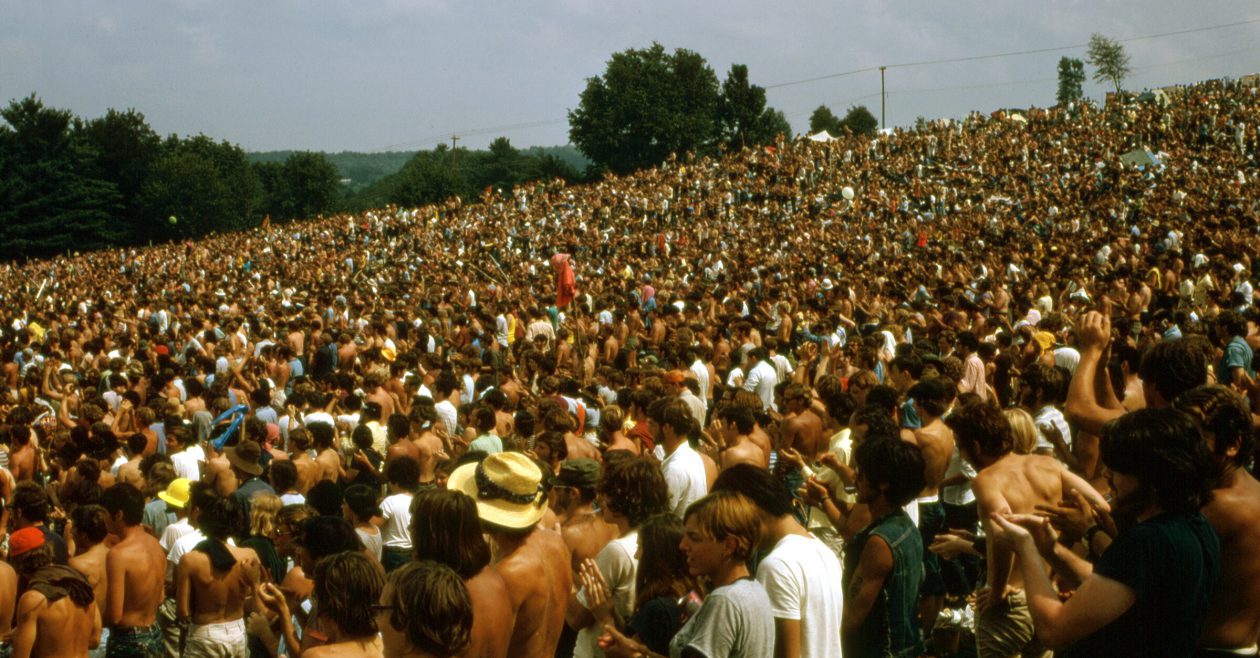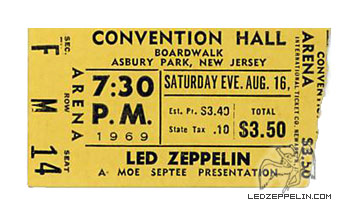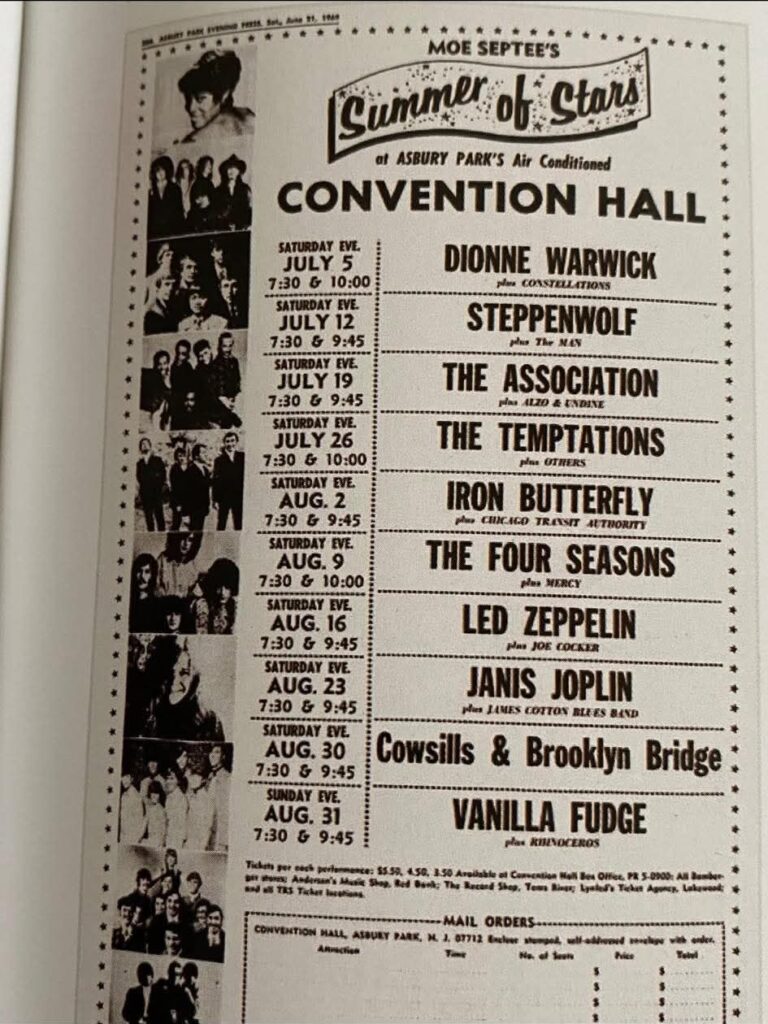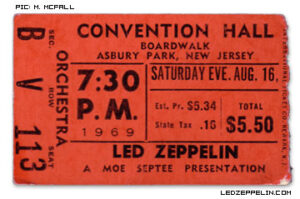1969 Asbury Park Summer of Stars
1969 festival #19
On my list of 1969’s rock festivals, I decided to include summer music series as well.
The Asbury Park Summer of Stars is another one of them.
1969 Asbury Park Summer of Stars
Mo Septee
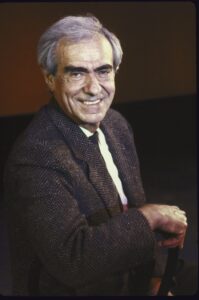
Organized by Moe Septee (Moses Septytor–a rabbi he met advised him to change his last name if he wanted a career in entertainment.) was born in 1925. When he was three, his parents, fled their native Poland’s antisemitism and sought opportunity in the United States. They settled in Newark, NJ.
In a 2008 article in New Jersey Monthly, Bruce Springsteen wrote:
Septee didn’t start out down the [New Jersey] Shore. He began close to home, at Newark’s Mosque Theater—today known as Newark Symphony Hall—where his first booking, sometime in the late 1950s, was Andrés Segovia, the father of modern classical guitar. On May 2, 1961, Septee helped bring Judy Garland to Newark for a show that, according to news accounts, packed about 3,800 people into the 2,800-seat hall.
By then, he and his wife, Ruth, had three young daughters, and he noticed that young people were listening to a different kind of music. He met Bob Dylan after booking Joan Baez and then booked Dylan twice. In 1964 he produced the Beatles’ appearance in Philadelphia.
1969 Asbury Park Summer of Stars
Asbury Park Convention Hall
By the mid-1960’s, the Asbury Park Convention Hall was no longer attracting the sold-out performances it once had. Septee thought that booking acts that would attract a more youthful audience would revitalize the venue. Asbury Park pushed back fearing undisciplined kids.
Septee prevailed.
1969 Asbury Park Summer of Stars
John Scher
John Scher grew up in northern New Jersey, though he went to college at Long Island University and got his first concert-promoting experience there. One summer (1969 or 1970) he got a job at the Sunshine In in Asbury Park, booking shows.
In 1971, Scher converted the Capitol Theatre, a movie house in Passaic, NJ, into a concert venue, and started doing shows at the Casino in Asbury Park as well…right nearby Septee’s shows.
In a Backstreets.com article, Scher said Septee was: “Very good guy, very interesting guy. Didn’t know a thing about what was going on in contemporary music, and actually — and it’s hysterical to say that in this day and age — actually trusted the agents, that they’d sell him the right shows. He’d been doing it, and I had gone to shows when I was a teenager: I used to spend much of the summers down in Bradley Beach, and we used to walk over to Asbury Park and go to Moe Septee’s Summer of Stars.“
1969 Asbury Park Summer of Stars
Led Zeppelin/Joe Cocker
Of all the shows Septee booked for 1969 series, the more interesting one, not just because of who performed, but when they played, was Joe Cocker opening for Led Zeppelin on August 16.
Many Woodstock fans know that Led Zeppelin had been invited to play at Woodstock, but turned it down. Cocker not only performed that night, but traveled to Bethel in time to open on Sunday!
J.Pikula wrote in the Asbury Press‘s August 18 edition:
A good example – perhaps the best in one case – of a thing called British Blues was heard at Convention Hall Saturday night when Led Zeppelin and Joe Cocker shared a double bill.
The main attraction, Led Zeppelin, is a four-man unit headed by guitarist Jimmy Page. It features Robert Plant on lead vocals and harmonica and produces a kind of contemporary blues (Page’s term)-hard rock blend of things written mainly by Page, John Paul Jones (the group’s bassist, pianist, organist, and arranger) and John Bonham, its drummer.
Joe Cocker, on the other hand is mainly an interpreter of songs. He is about the best voice interpreting the blues today, and is rapidly gaining an audience of ardent followers in the US as well as England. His group – which looks as if it is still the Grease Band, a Sheffield group he’s been with for several years, is one of the most together groups playing today- The Who notwithstanding.
1969 Asbury Park Summer of Stars
Septee’s Summer of Stars ends
In 1975, Septee stopped booking concerts at Convention Hall. He went another direction to become a Broadway producer, bringing Bubbling Brown Sugar, Yentl, and Richard III with Al Pacino to the stage.
He won Tony Awards for:
| 1976 | Best Musical | Bubbling Brown Sugar | |
| 1977 | Most Innovative Production of a Revival | Guys and Dolls |
Septee died on April 1, 1997. He was 71. His New York Times obituary emphasized his classical background: “Moe Septee, a theatrical producer and founder of the successful Philly Pops orchestra…”
1969 Asbury Park Summer of Stars
Next 1969 festival: Newport Jazz
